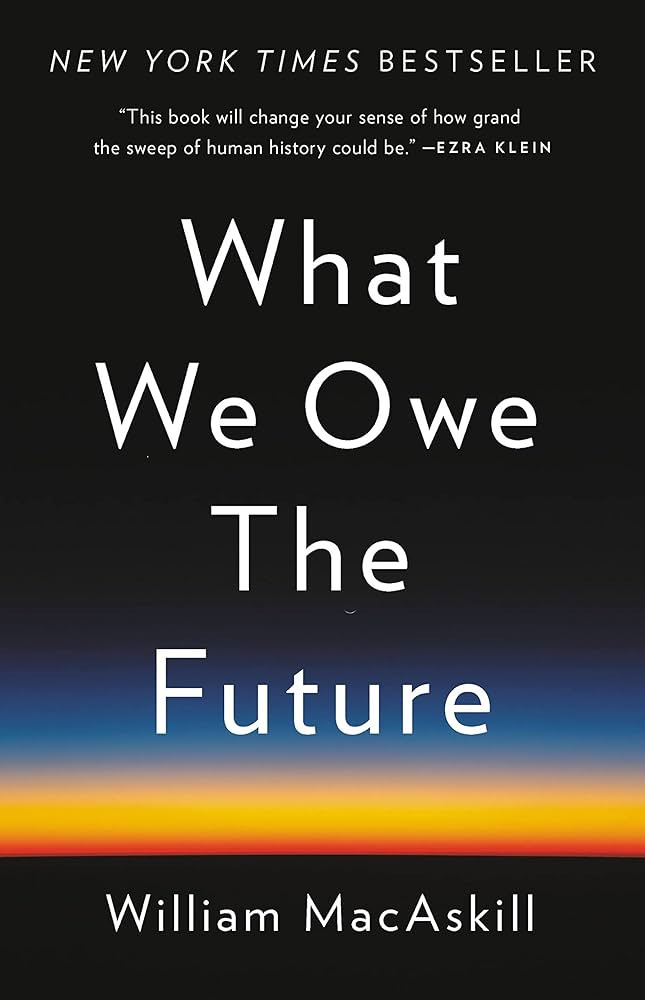🌻 tech right (disambiguation)
provocations 1.10.25
Dear reader,
Cunningham’s Law is one of my favorite things about the internet. It goes: "The best way to get the right answer on the internet is not to ask a question; it's to post the wrong answer." Some fear disagreement from the online hordes; I think the opportunity to get corrected is one of the main reasons to post.
In that spirit, I’m trying to be less perfectionist and more impressionistic with this letter. When I don’t have a big research/reporting project, I’ll share “provocations”: half-baked takes, mini lit reviews, group chat excerpts, fun facts, book reviews, and reactions to the “discourse.” (The curation process is just going through my Notes app.) You can assign everything here something like a 50% confidence level, and I welcome you to explain why I am wrong (ideally civilly). As always, you can email jaswsunny at gmail dot com.
Today’s provocations:
Disambiguating the “tech right”
Ins and outs for 2025
Scenes from San Francisco
Paid subscriber notes
Disambiguating the “Tech Right”
Update (Feb 2025): After more reading & conversations, I updated my“grand theory of the tech right” for Twitter here.
The biggest political vibe shift of 2024 was tech leaders’ newfound public love for the Trump administration.1 From Elon hitting the campaign trail to Marc Andreessen’s “Techno-Optimist Manifesto,” the “Tech Right” ascended so hot and so fast that it’s easy to forget that they’re still the new kids on the block. And yet for all the tweets and high-profile appointments, I still find myself wondering what the “Tech Right” means and what it stands for. Clearly this isn’t your grandpa’s neoconservatism. The vibe has moved right, but my gut says it’s more complex than it looks.
Left-liberal writing about the “Tech Right” is often muddy. We’re always more sensitive to divisions in our own tribe than in others—try calling an anarcho-communist a “liberal” and see what happens—and the left has a tendency to collapse all analysis to class at the cost of nuance.2 Many of the most ardent supporters of immigration in the H1-B debate, for example, would more likely identify as Democrats or independents rather than Republicans; I bet many voted for Harris in last November’s election (whether publicly or not). But because they are tech founders, and founders are bosses, they get tossed by left commentators into the same “Tech Right” boat.
This made me curious how self-identified right-wing thinkers view the newcomers to their coalition. (Again, the ingroup always levers the most precise critiques.) As the H1-B firestorm hinted, there’s substantial internal debate over the role tech ought to play in the right-wing movement—a much more conflicted relationship than I’d imagined from my bubble.
So what is the “tech right,” and how does it depart from the conservative and libertarian right? Here’s one summation, from Mary Harrington in Unherd:
As a worldview, it is broadly pro-capitalist, enthusiastically pro-technology and unabashedly hierarchical, as well as sometimes also scornful of Christian-inflected concern for the weak.
This essay from N.S. Lyons on the rise of the “Right-Wing Progressive” is very thorough:
RWPs are what Virginia Postrel, in her 1998 book The Future and Its Enemies, approvingly dubbed “dynamists”: individuals whose primary vision for a good society is a state of constant Promethean invention, discovery, growth, and transformation. They see their true enemies as what Postrel labels “stasists”: nostalgia-ridden, backwards-looking brutes who hate change and for some unimaginable reason want to keep everything old and therefore obsolete from being replaced by new and better things. [...]
The RWP believes the purpose of the state (and in fact all of civilization) is to facilitate the maximization of progress. If a hands-off, low-tax, free market approach seems to be what will facilitate the most progress, he’s for that. If the state-directed policies of an enlightened authoritarianism would produce more progress, he’s for that too. And if what progress really demands is that democracy be replaced with a monarch, well then long live the king!
And the living enigma that is Richard Hanania:
The Tech Right combines the acceptance of inequality of the right with the openness to change of the left.
The more traditional conservatives—not Hanania, that is—go on to express skepticism about the “Tech Right”’s lack of a moral compass (of the Christian sort); its willingness to endure short-term social harms for long-term economic gains; and its overall bias toward disruption—whatever chaos may come. They’re suspicious of tech’s talk about “human capital” and its flirtations with fascism. The essays read like a warning to fellow reactionaries: Can the tech titans be trusted to preserve American values? Or are they riding the Trump train on the way to a robot-ruled transhumanist utopia? Take slogans like Accelerate or die!—there’s nothing “conservative” about it.
Robert Bellafiore’s review of James Pethokoukis’s new book, The Conservative Futurist, makes a similar rebuttal. Skeptical of the stance that sufficiently advanced technology can supersede politics, Bellafiore challenges Pethokokoukis to cohere his “tech” and “right” commitments:
Here are a few of the contemporary technological questions to which it is essential that conservatives find answers: How can we counteract the rise of an all-encompassing surveillance state, whether administered by the government or corporations? What should we do about online pornography, human and AI-generated alike? Should we tamper with our natures through extreme life-extension, artificial wombs, or uploading our minds into computers? Most of all, how can we use technology to fortify the traditions we value, rather than dissolve them?
I was most surprised to see that right-wing rebukes of the “Tech Right” are near-identical to those that left tech critics make (toward different ends). It makes you wonder, as Andreessen and Pethokoukis both pose, whether the more important division is not left/right but rather accel/decel.
~
The “Tech Right” is just one faction in a rising alliance of thinkers, policymakers, and industrialists that spans the political spectrum, united by their focus on accelerating American innovation to drive growth and global primacy. I’ll refer to this blob as the “progress coalition.”3 They are the most dynamic and interesting policy machine on the scene right now.
Crucially, this group transcends parties and affiliations. Members might individually identify as “gray tribe,” “supply-side progressives,” “e/accs,” “abundance liberals,” or “American dynamists” (these are all different flavors); others look like plain old neolibs and neocons to me.4 Pet issues include R&D funding, rivalry with China, government/defense modernization, talent attraction, and deregulating supply in domains like housing, energy, and medicine. Favorite philosophers include David Deutsch and Thomas Kuhn5; viral charts include variations on this one (representing either government overreach6 or Baumol’s cost disease), and “percentage of federal R&D spending as share of GDP.” These folks believe in both markets and market failures, both the motivating magic of capitalism and the need for competent governors to speed up growth when it slows. I suspect that many coalition members, in their ideal world, would prefer not to think about politics at all.


Notably, a coalition is not an ideology. It does not demand internal coherence or consistency; it does not need to reflect deep-rooted principles. Rather, coalitions devise a strategic and often temporary alignment around a limited set of common goals—in this case, propelling technology forward.
Coalitions are the bedrock of politics, especially in a two-party system. But when the members of a coalition carry conflicting beliefs, that can present a problem. Many progress coalition institutions are committed to nonpartisanship. But I’m curious how they will navigate the political loyalty tests, compromises, and internal fissures that face any policy org.
For instance, the progress coalition is broadly in favor of government efficiency and deregulation (repeal the rules! fire the bureaucrats!). This obviously raises the question of deregulation for what? I don’t see anyone advocating that we cut police budgets or nix export controls on chips; clearly removing high-skilled immigration bottlenecks is harder than it seems. DOGE is posting about research grants for quail sex, so perhaps we need another rule to increase scientific R&D but only when it’s good. I’d be excited to break ground on nuclear energy again, but does that mean doling out permits to oil rigs too? And there’s the rub.
An ethic of pure progress will accelerate equally toward shitcoins, space, and solar energy. For the diversified investor class, this may be just as well, but the rest of us must live in the world that VC built. AI friends, sports gambling, protein synthesis, killer drones—are all these inventions equally good?
This tension within the progress coalition becomes starker as we consider the political reality ahead. In an empowered Trump administration, I have a hard time seeing the liberal futurists prevailing (would love to be wrong). My friend Benjamin Murphy articulated this well:
To be clear, there are areas of genuine bipartisan agreement—places where the “Tech Right” and their liberal counterparts can find common ground. I think upgrading our country’s physical infrastructure is one; in that case I hope the progress coalition succeeds. Tech’s involvement in local Democratic governance—e.g. the Daniel Lurie administration in San Francisco—is also a space I’m keen to watch.
But as more tech folks jump aboard the progress train, I’d suggest that they go one click deeper in illustrating what kind of society we’re hurtling toward. Which technologies they’d like to see in abundance, and which they’d prefer stay scarce. And put away the cyberpunk for a second: What about our relationships to each other? The kind of “good life” we want to live? How might our technologies bring different social organizations about? These are harder questions, and more controversial, but they are important. Directionality matters. You can kill all the meetings you want and still not know what to build.
Abundance alone cannot resolve the infinite values we each hold dear. It can mitigate conflicts by enabling choice, for example, offering someone the ability to live either near a park or in a busy downtown. But our visions and values are also fundamentally social, reflecting the way we want an entire community to look and work. Yes to more housing—and to weaving a simultaneous vision of where to build, why, and for whom. Of course residents want to know what their city will look like after the red tape is cut. It’s only human. Failing to specify will not prevent prioritization tradeoffs from happening; it’ll just cede that decision to speed and profit alone.
Here’s a personal example. I worked on a recent project called Public AI, advocating for publicly funded datasets and shared compute. My collaborators and I aimed to make academic and open-source AI development competitive with the big labs. But when we brought the idea to folks outside the narrow science/tech scene, it was a much tougher sell. Why spend taxpayer money on AI of all things? Isn’t that just helping kids cheat and taking our jobs? “Innovation” for its own sake was too abstract; we needed to articulate concrete benefits to this growth.
I think more discussion of ends will make for a more effective pro-progress movement. Some people—especially in Silicon Valley—are dispositionally risk-and-change-loving, many are not. You can’t bulldoze decels into compliance, on the right or the left. Tech moves fast and trust moves slow. The future is coming, and we must bring people along.
Ins & outs for 2025
(Shoutout R for making this with me. Predictions are NOT endorsements.)
Scenes from San Francisco
I learned on a walk that Bernal Heights in San Francisco used to be called “Red Hill” because of how many communists lived there. (These days, you’ll probably find more capitalist accelerationists.)
I was watching a nice sunset at Ocean Beach when my friend was like “haha this looks just like the cover of What We Owe The Future.” He was right but the view was ruined. Do not do this.


Paid subscriber notes
Very grateful for those of you who have donated via a paid subscription! Here are a few of the notes I’m allowed to share. (If you liked this post or just want to support, consider upgrading! For your $8/month I can work from a coffeeshop for about 4 hours before feeling bad about it.)




Have a great weekend,
Jasmine
It’s certainly true that Silicon Valley—along with the country as a whole—has moved right over the last several years; this chart of CEO campaign contributions reflects the shift.
Once you’re rich enough to buy everything you want for yourself and 10 generations after, you realize that status/politics/fun matters more. This is why the billionaires tweet.
I’m not sure that this is the most accurate descriptor vs. “accelerationist” or “pro-tech” or something, and not all progress is scientific/industrial/technological—but this seems appropriate given the role of “progress studies” in animating the movement.
I’ve also heard “Robert Moses libertarian,” which is pretty amusing. What does that even mean!
Thomas Kuhn and Karl Popper (who inspired Deutsch) famously disagreed on how science happens, the former focusing on sociological “paradigm shifts” and the latter on rational hypothesis-testing and falsification.
(Thanks Gabriel Birnbaum for letting me know about this.)
Noah Smith does some good analysis/debunking of this chart here.





> the “Tech Right”’s lack of a moral compass (of the Christian sort)
Here’s one update I suggest for you: The Christian/Nietzschian divide definitely runs through the tech right, and tbh even through the hearts of many key figures on the tech right.
If you aren’t talking to some people who think it’s both time to build and time to accept Christ you’ll be missing a fascinating part of what’s going on.
What makes the matter so tricky, in my opinion, is that, as soon as it comes to elections and political decisions, the exciting inner complexity of political discourse is sharpened into a binary opposition – especially in a two-party system. This is partly due to the logic of political communication, but not exclusively. An interesting question for me is, therefore, How can a political order be designed to open up discourse in concrete decision-making processes rather than closing it off? How can it promote case-by-case decisions that are less about following an absolute guiding principle (e.g., innovation) and more about considering the impact of a specific decision on people's lives, asking whether it makes life better?